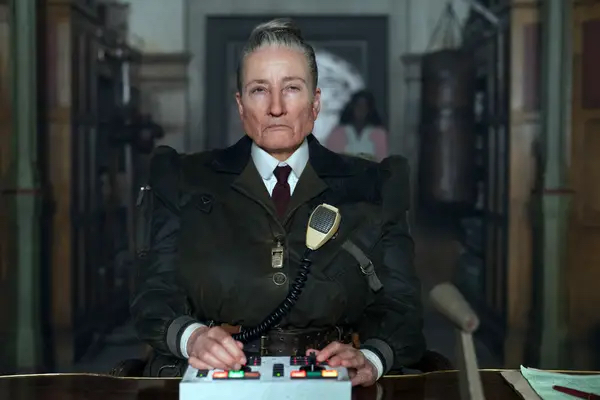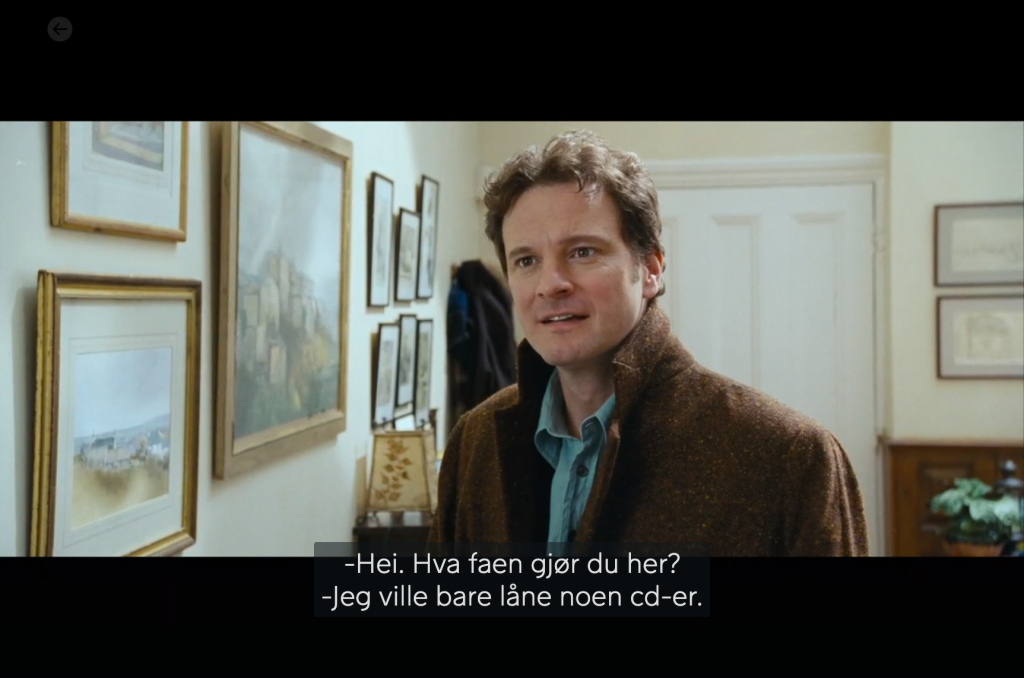Over the Christmas break in December 2022, Netflix released their movie version of Matilda – The Musical, which has run for a number of years in London’s West End and on Broadway in New York. Based on Roald Dahl’s book by the same name, both the musical and the movie are aimed at families, with the movie version receiving a rating of PG (Parental Guidance) in the UK and the US and 7+ in Norway, meaning that children down to the age of five can watch the film when accompanied by an adult.
So, taking the main audience into account, one might expect not to find taboo language in either the dubbed or subtitled version. However, in one of the major musical numbers “The Hammer” the evil and narcissistic Ms Trunchbull sings about her determination to become a hammer throwing champion in her younger years and the English lyrics goes as follows:
“Do you think in that moment, when my big moment came
That I treated the rules with casual disdain?
Well? Like hell!”
In the Norwegian version, both the dubbed and the subtitled, the lyrics are as follows:
“Tror du i det sekundet da jeg fikk sjansen min
At jeg lett som en fjert kastet reglene hen?
Ja? Ikke faen!”
Which loosely backtranslates as: Do you think in that second when I got my chance/that I light as a fart threw the rules away?/Yes? No devil (or ‘the devil I didn’t)!
As we can see, the Norwegian translation can be said to be fairly close in meaning to the original text. In the second line casual disdain has been replaced with a more colloquial saying in Norwegian lett som en fjert. Such choices are most likely due to the translator having a focus on essential features of the dubbing process, where the need for lip, or phonetic, synchrony as well as temporal synchrony being of equal importance to the meaning (Chaume 2012)[1]. Also, since this is a song translation, the number of syllables are identical, in order not to disturb the rhythm of the musical soundtrack.
In this post I want to focus on the translation of the phrase “like hell”, which in both the Norwegian dubbed dialogue and the subtitles is translated with “ikke faen”. As can be seen from the loose back-translation, “ikke faen” is a close equivalent to “like hell” if we just look at the literal meaning. However, when we look at the pragmatic function of the English idiom “like hell” and the Norwegian “ikke faen”, then a more marked difference between the two appears.

According to Cambridge dictionary (dictionary.cambridge.org)[2], most swearwords and taboo expressions in English involve reference to religion or body and bodily processes, often of a sexual nature. In general, English taboo expressions such as “like hell”, which involves religion, are thought of as being weaker and less impactful than those which involve bodily action or functions, such as fuck or shit. Therefore, it might not be unreasonable to assume that to an English native speaker, an expression such as “like hell”, might be more casual and less offensive than other swear words, perhaps even to the extent that people will hardly notice it. Such taboo expressions are perhaps more commonly used for emotional emphasis, rather than to cause offense.
In Norwegian, on the other hand, the strongest taboo expressions are associated with religion (Hasund 2006)[3], meaning that expressions that invoke references to hell and Satan are emotionally stronger. Even though Norway is a secular country, where a decreasing proportion of the population belong to a religious community, language norms governing the use of profanities still stand strong and using expressions such as “ikke faen” is still considered taboo in Norwegian culture (Fjeld 2014)[4].
Some might argue that a better equivalent to “like hell” would be “ikke søren” in Norwegian, where the male name Søren is used as a euphemistic derivative for Satan (naob.no)[5]. This would then fall under what Hasund (ibid.) refers to as nestenbanning (lit. almost swearing), and would have a similar pragmatic function to the source language idiom. However, this is where the intricacies of dubbing comes into play, because as already mentioned, dubbing not only has to take into account translation, but also lip synchronization and speed, the dubbed voice has to stop when the lips of the actor stops moving, in order to maintain the illusion that the actor is speaking in the dubbed language. Adding to that that the character is singing, it is also not desirable to add extra syllables to lyrics, as this will interfere with the rhythm of the song.
Another interesting point is that not only is the target language much stronger than the source language, it also makes the character, who is otherwise extremely concerned with discipline and self-control, seem uncharacteristically vulgar. Later in the movie there is a scene where Ms Trunchbull goes into a long tirade where she uses several profanities and strong language, but in that scene the fact that she loses control of her emotions is part of the plot.
This does not only happen in dubbed films, but also in other audiovisual settings the concept of hell and other taboo expressions and their pragmatic function in English is sometimes lost. In a subtitled version of Love Actually (2003), the line “Hello! What the hell are you doing here?” was translated as “Hei. Hva faen gjør du her?” in one Norwegian version (different broadcasters and streaming companies use different subtitle vendors, so depending on which streaming). While this is a literally correct translation of the expression “what the hell”, it cannot be said to be semantically accurate. Whereas “what the hell” in English is a pretty casual way of expressing surprise, “hva faen” is far more aggressive in Norwegian. Add to the fact that the scene shows a smiling and surprised man in a light and airy room, and the stark contrast between what is being said and what is written in the subtitles, becomes perhaps even more evident.

This is just one example, and it must be taken into consideration that this could be a result of machine translation, where the software is unable to pick up context and visual clues. In other Norwegian versions, the subtitles are toned down, with one version (NRK) using a non-offensive expression of surprise “Hva i alle dager gjør du her?” (lit. what in all days do you here?) and another (Amazon Prime) neutralizing the expression with the help of reduction of the source text: “Hva gjør du her?” (lit. what do you here?)
Do I think that Norwegian parents watching Matilda with their children will react to one of the characters saying “ikke faen” as part of a musical number? Not necessary, swearing in film and tv has become increasingly more common, even in programmes aimed at younger audiences, so it might not cause much offense among audiences. Incidentally, the actor voicing Ms Trunchbull also has a Northern Norwegian accent, and in Norway, people from the North are known to have a much stronger and colourful language, so this might also lead to people not noticing. A number of cases from the Norwegian broadcast regulator, Kringkastingsrådet[6],[7],[8], however, does show that swearing and taboo language, particularly in programmes aimed at younger audiences are one of the issues that garners most complaints from viewers.
Fjeld’s article from 2014 shows that there was a considerable increase in the number of swearwords and taboo expressions on tv in the period between 1998-2010, both in Norwegian language programming and in foreign language content. With the enormous growth of streaming platforms and online video content in the last decade, there’s no reason to believe that this hasn’t increased even more since Fjeld conducted her study. Also, as it becomes more common to use machine translations in subtitling[9], cases like the example from Love Actually, might become even more common. Recent studies point to the quality of subtitles involving machine translation being poorer than those done ‘manually’ by a human translator (Hagström & Pedersen 2022)[10].
If nothing else, as long as machines are not able to interpret context, emotions and other intertextual clues, the need for human agency in subtitling seems to be very much called for. For translators it seems to come back to the question of cultural awareness, meaning that in order for the translation to be correct, it is important to be aware of the cultural differences in language and that the pragmatic function of expressions in the source language might be quite different than similar expressions in the target language. Not least does it perhaps also show that for translators working with dubbing and subtitles, the context, such as scene, character and plot, is key for getting the tone of the translation just right, or else they risk breaking with viewers expectations and impressions of both characters and the narrative taking place on screen.
References
[1] Chaume, Frederic (2012) Audiovisual Translation: Dubbing. Manchester: St Jerome Publishing
[2] Cambridge Dictionary online. https://dictionary.cambridge.org/grammar/british-grammar/swearing-and-taboo-expressions. Accessed 20 January 2023
[3] Hasund, Ingrid Kristine (2006) Religiøs banning og nestenbanning. https://www.sprakradet.no/Vi-og-vart/Publikasjoner/Spraaknytt/Arkivet/2006/Spraaknytt_1_2006/Religioes_banning/. Accessed 23 January 2023
[4] Fjeld, Ruth Vatvedt (2014) Banning på tv: mer vanlig, mindre tabu. https://www.sprakradet.no/Vi-og-vart/Publikasjoner/Spraaknytt/spraknytt-2014/Spraknytt-22014/Banning-pa-tv-mer-vanlig-mindre-tabu/. Accessed 23 January 2023.
[5] NAOB Det Norske Akademis Ordbok online. https://naob.no/ordbok/s%C3%B8ren. Accessed 23 January 2023.
[6] «Kringkastingsrådet advarer NRK om banning» (2014) https://www.aftenposten.no/norge/i/gPM41/kringkastingsraadet-advarer-nrk-om-banning
[7] «TV-seere klager på banning i MGP Jr: -Udannet og grotesk» (2019) https://kampanje.com/medier/2019/06/tv-seere-klager-pa-banning-i-mgpjr/
[8] «Uenighet om banning i NRK» (2020) https://m24.no/banning-karoline-riise-kristiansen-kathrine-kleveland/uenighet-om-banning-i-nrk–vi-ma-tale-et-visst-niva-av-banning/271619
[9] «Maskiner har begynt å oversette film og TV» (2022) https://www.nrk.no/kultur/gode-oversettelser-blir-oversett-pa-strommetjenestene-1.16199448
[10] Hagström, H., & Pedersen, J. (2022). Subtitles in the 2020s: The Influence of Machine Translation. Journal of Audiovisual Translation, 5(1), 207–225.
